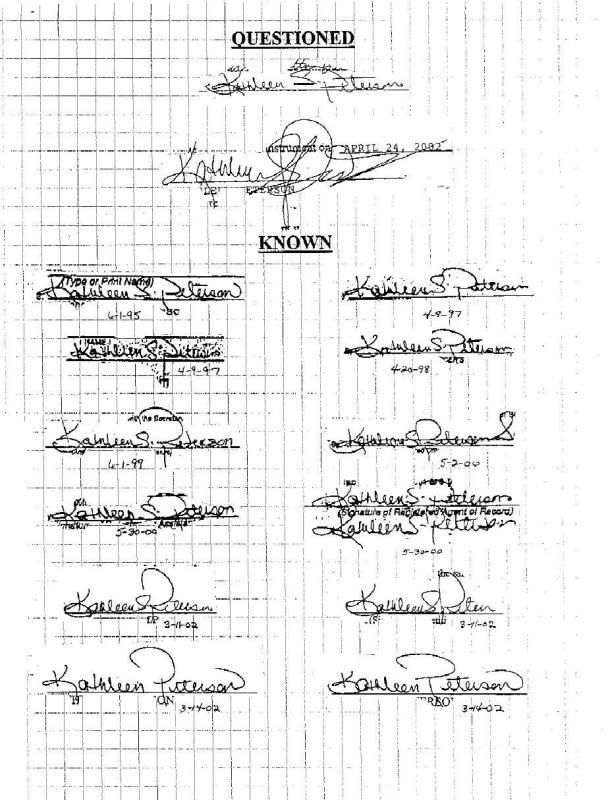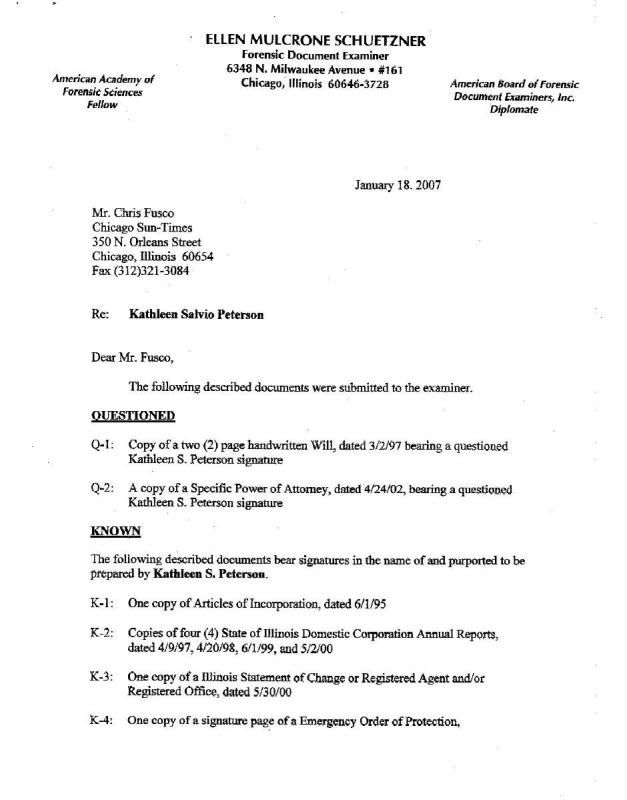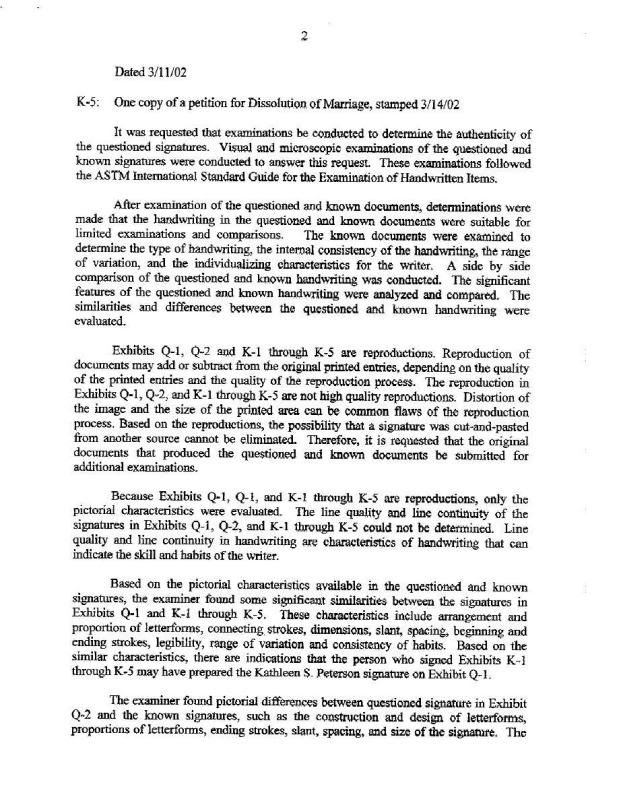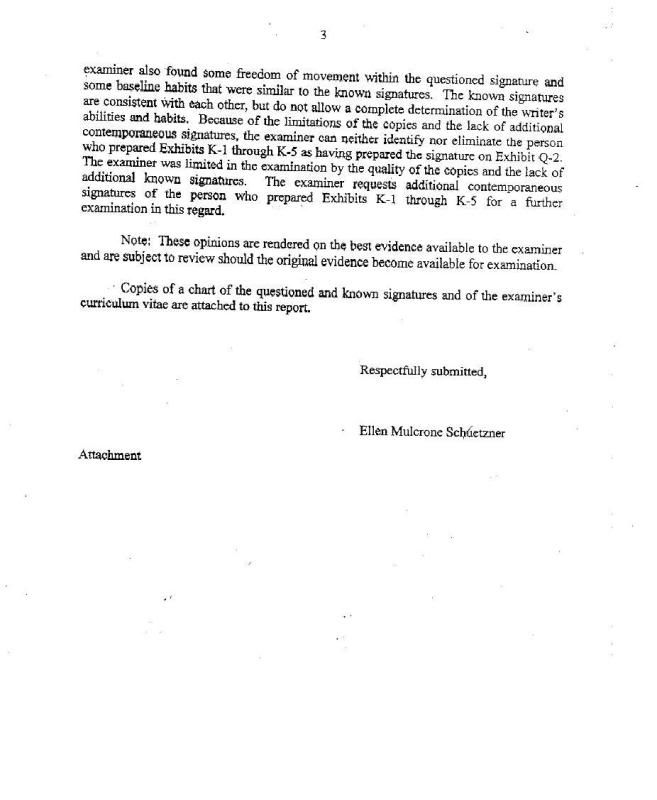Post by Lorie Taylor on Oct 20, 2009 3:13:57 GMT -6
www.suntimes.com/news/peterson/758919,CST-NWS-drew25.article
Is Savio's signature faked?
DREW PETERSON CASE | Kathleen Savio's family doubts Drew's third wife signed off on deal to buy house; handwriting analysis also raises some questions
January 25, 2008
BY CHRIS FUSCO, DAN ROZEK AND STEFANO ESPOSITO Staff Reporters
Before Drew Peterson could buy a house in 2002 for himself and his 18-year-old girlfriend, Stacy Cales, he needed his estranged wife, Kathleen Savio, to sign off on the deal.
But Savio's signature on the legal document looks markedly different from more than a dozen others she had written before she died in 2004, a Chicago Sun-Times investigation has found.
"That's definitely not her signature," Savio's sister, Anna Doman, said after viewing a copy of the one-page power of attorney that Drew Peterson himself notarized. "I know that's not her signature."
An analysis by a forensic document examiner also found some differences.
Ellen Mulcrone Schuetzner, whom the Sun-Times hired to study legal and business papers tied to Peterson and Savio, questioned the "proportions of letterforms, ending strokes, slant, spacing and size of the signature." Schuetzner, however, couldn't reach a definitive conclusion based on the quality and number of documents available to her.
"I can't eliminate the possibility that it is or isn't her signature," said Schuetzner, who has nearly 30 years of experience in her field.
Drew Peterson -- a retired Bolingbrook police sergeant -- insisted the signature is valid but referred questions about it to his attorney. Officials with the State Police and Will County state's attorney's office declined to comment.
The questions about the signature come as investigators probe Peterson's financial affairs in hopes of finding clues about Savio's death, as well as the disappearance of his fourth wife, Stacy Peterson, sources say. Stacy was 18 when she moved into the 6 Pheasant Chase Court house in Bolingbrook with Drew Peterson. She hasn't been seen since Oct. 28.
Savio's death -- once ruled an accidental bathtub drowning -- is being reinvestigated in the wake of Stacy's disappearance.
While they haven't named Drew Peterson a suspect in Savio's death, they have said they believe he was involved in Stacy's disappearance.
A valid will?
Questions are also being raised about a two-page handwritten will signed by Savio and Drew Peterson that's dated March 2, 1997. The document was taken into evidence by investigators Dec. 19, court records indicate.
One of the two witnesses who signed the will, Bolingbrook police officer Alex J. Morelli, has appeared before a Will County grand jury hearing evidence about Savio's death. Attempts to reach Morelli and the other witness, Gary L. Marcolina, were unsuccessful.
In a recent interview, Peterson, 53, said there is nothing wrong with the will, which was filed 15 days after Savio was found dead on March 1, 2004.
"We just tucked it away, and I found it after she died," Peterson said of the will. "There's nothing sinister and out-of-line about it. Everything was done proper."
At the time she died, Savio, 40, was in a court battle with Peterson over proceeds from the sale of a tavern they'd owned. Peterson, she claimed, had kept all the money from that sale.
The will named Peterson's uncle James B. Carroll executor of Savio's estate. Carroll went on to award Peterson control of virtually all of Savio's assets -- even though Peterson and Savio had divorced.
"The actions of the Executor were not in the best interest of the Estate or its beneficiaries," wrote Richard J. Kavanagh, the court-appointed administrator for Savio's estate.
Kavanagh was involved in the case because no one from Savio's family formally volunteered to represent the estate in court. He called the will a "purported will" in court papers.
"My concern is that this is a handwritten will that just popped up after she died," Kavanagh said this week. "It gives you the sense that it's something that's concocted."
A judge, however, accepted the will because Marcolina and Morelli testified in court March 23, 2005, that they witnessed Savio and Peterson signing the document, Kavanagh said.
Peterson dismissed Kavanagh's concerns and asserted that the lawyer is angry that he couldn't notch a hefty sum in legal fees off Savio's case.
Schuetzner, the document examiner hired by the Sun-Times, examined Savio's signature on the will and found "a lot of consistency" with Savio's other signatures.
Savio's sister, Doman, was uncertain about Savio's signature on the will. But she was more concerned about other aspects of the document, including that its first page equally divides Savio's assets among her two children and her two stepchildren.
Savio, according to Doman, said a month before her death that she'd written a new will that would leave everything to her two young sons, now ages 13 and 15.
"She told me she had a new will. She promised to get me a copy," Doman said. "She was dead before she could get it to me."
Doman added that her family wasn't aware until recently that the will named Carroll, Drew Peterson's uncle, executor of Savio's estate.
Peterson counters the family had an opportunity to get involved in the case. "If they didn't like it, well, they should have done something. They didn't," Peterson said.
Carroll did not return calls seeking comment.
Peterson Inc.
Besides Peterson's work as a cop, Savio and he had run two businesses during their married life: the tavern company, called Blue Lightning Corp., and a printing firm, DA. P.A.G.E. Inc., state records show.
Separately, Peterson dabbled in real estate. He and two partners bought and flipped two homes in 2000 and 2001.
In March 2002, both Peterson and Savio filed for divorce. On March 22, 2002, Savio agreed in court to waive any future ownership rights to the house that Drew Peterson wanted to buy for himself and Stacy in Bolingbrook.
A power of attorney document, dated about a month after that court appearance, formalized the agreement and included Savio's signature. Peterson used the document to secure a $226,600 mortgage the next day.
Peterson said Savio willingly signed the form even though the couple was separated and getting divorced. Peterson also said he bought the house without any financial help from Savio.
"I wanted to buy this place but I didn't want it tied up in divorce court," he said of the home. "I bought it without her help financially. There was nothing improper about it."
The power of attorney document that includes Savio's signature needed to be notarized -- something usually done by a notary public who has no financial interest in the deal. But Peterson himself notarized the document, which makes it difficult to independently verify Savio's signature.
"If it was a forgery, she had ample time to have her and her lawyer object and make an issue of it," said Peterson's lawyer, Joel Brodsky. "Obviously it could have been done better, but I don't know that it's anything untoward."
Contributing: Kara Spak, Natasha Korecki
Is Savio's signature faked?
DREW PETERSON CASE | Kathleen Savio's family doubts Drew's third wife signed off on deal to buy house; handwriting analysis also raises some questions
January 25, 2008
BY CHRIS FUSCO, DAN ROZEK AND STEFANO ESPOSITO Staff Reporters
Before Drew Peterson could buy a house in 2002 for himself and his 18-year-old girlfriend, Stacy Cales, he needed his estranged wife, Kathleen Savio, to sign off on the deal.
But Savio's signature on the legal document looks markedly different from more than a dozen others she had written before she died in 2004, a Chicago Sun-Times investigation has found.
"That's definitely not her signature," Savio's sister, Anna Doman, said after viewing a copy of the one-page power of attorney that Drew Peterson himself notarized. "I know that's not her signature."
An analysis by a forensic document examiner also found some differences.
Ellen Mulcrone Schuetzner, whom the Sun-Times hired to study legal and business papers tied to Peterson and Savio, questioned the "proportions of letterforms, ending strokes, slant, spacing and size of the signature." Schuetzner, however, couldn't reach a definitive conclusion based on the quality and number of documents available to her.
"I can't eliminate the possibility that it is or isn't her signature," said Schuetzner, who has nearly 30 years of experience in her field.
Drew Peterson -- a retired Bolingbrook police sergeant -- insisted the signature is valid but referred questions about it to his attorney. Officials with the State Police and Will County state's attorney's office declined to comment.
The questions about the signature come as investigators probe Peterson's financial affairs in hopes of finding clues about Savio's death, as well as the disappearance of his fourth wife, Stacy Peterson, sources say. Stacy was 18 when she moved into the 6 Pheasant Chase Court house in Bolingbrook with Drew Peterson. She hasn't been seen since Oct. 28.
Savio's death -- once ruled an accidental bathtub drowning -- is being reinvestigated in the wake of Stacy's disappearance.
While they haven't named Drew Peterson a suspect in Savio's death, they have said they believe he was involved in Stacy's disappearance.
A valid will?
Questions are also being raised about a two-page handwritten will signed by Savio and Drew Peterson that's dated March 2, 1997. The document was taken into evidence by investigators Dec. 19, court records indicate.
One of the two witnesses who signed the will, Bolingbrook police officer Alex J. Morelli, has appeared before a Will County grand jury hearing evidence about Savio's death. Attempts to reach Morelli and the other witness, Gary L. Marcolina, were unsuccessful.
In a recent interview, Peterson, 53, said there is nothing wrong with the will, which was filed 15 days after Savio was found dead on March 1, 2004.
"We just tucked it away, and I found it after she died," Peterson said of the will. "There's nothing sinister and out-of-line about it. Everything was done proper."
At the time she died, Savio, 40, was in a court battle with Peterson over proceeds from the sale of a tavern they'd owned. Peterson, she claimed, had kept all the money from that sale.
The will named Peterson's uncle James B. Carroll executor of Savio's estate. Carroll went on to award Peterson control of virtually all of Savio's assets -- even though Peterson and Savio had divorced.
"The actions of the Executor were not in the best interest of the Estate or its beneficiaries," wrote Richard J. Kavanagh, the court-appointed administrator for Savio's estate.
Kavanagh was involved in the case because no one from Savio's family formally volunteered to represent the estate in court. He called the will a "purported will" in court papers.
"My concern is that this is a handwritten will that just popped up after she died," Kavanagh said this week. "It gives you the sense that it's something that's concocted."
A judge, however, accepted the will because Marcolina and Morelli testified in court March 23, 2005, that they witnessed Savio and Peterson signing the document, Kavanagh said.
Peterson dismissed Kavanagh's concerns and asserted that the lawyer is angry that he couldn't notch a hefty sum in legal fees off Savio's case.
Schuetzner, the document examiner hired by the Sun-Times, examined Savio's signature on the will and found "a lot of consistency" with Savio's other signatures.
Savio's sister, Doman, was uncertain about Savio's signature on the will. But she was more concerned about other aspects of the document, including that its first page equally divides Savio's assets among her two children and her two stepchildren.
Savio, according to Doman, said a month before her death that she'd written a new will that would leave everything to her two young sons, now ages 13 and 15.
"She told me she had a new will. She promised to get me a copy," Doman said. "She was dead before she could get it to me."
Doman added that her family wasn't aware until recently that the will named Carroll, Drew Peterson's uncle, executor of Savio's estate.
Peterson counters the family had an opportunity to get involved in the case. "If they didn't like it, well, they should have done something. They didn't," Peterson said.
Carroll did not return calls seeking comment.
Peterson Inc.
Besides Peterson's work as a cop, Savio and he had run two businesses during their married life: the tavern company, called Blue Lightning Corp., and a printing firm, DA. P.A.G.E. Inc., state records show.
Separately, Peterson dabbled in real estate. He and two partners bought and flipped two homes in 2000 and 2001.
In March 2002, both Peterson and Savio filed for divorce. On March 22, 2002, Savio agreed in court to waive any future ownership rights to the house that Drew Peterson wanted to buy for himself and Stacy in Bolingbrook.
A power of attorney document, dated about a month after that court appearance, formalized the agreement and included Savio's signature. Peterson used the document to secure a $226,600 mortgage the next day.
Peterson said Savio willingly signed the form even though the couple was separated and getting divorced. Peterson also said he bought the house without any financial help from Savio.
"I wanted to buy this place but I didn't want it tied up in divorce court," he said of the home. "I bought it without her help financially. There was nothing improper about it."
The power of attorney document that includes Savio's signature needed to be notarized -- something usually done by a notary public who has no financial interest in the deal. But Peterson himself notarized the document, which makes it difficult to independently verify Savio's signature.
"If it was a forgery, she had ample time to have her and her lawyer object and make an issue of it," said Peterson's lawyer, Joel Brodsky. "Obviously it could have been done better, but I don't know that it's anything untoward."
Contributing: Kara Spak, Natasha Korecki







 why killer murdered of Kathleen and Stacey An Cales Peterson
why killer murdered of Kathleen and Stacey An Cales Peterson